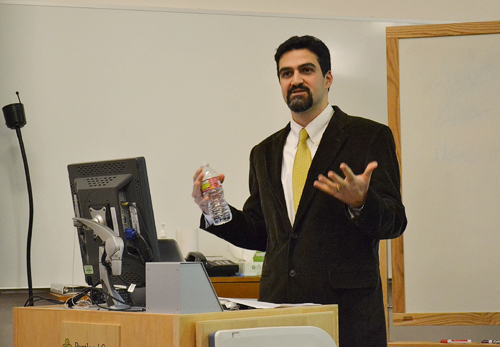The extensive Middle East studies collection at Portland State’s Branford P. Millar Library dates back to the early 1950s with the creation of the Middle East Studies Center for undergraduate studies.
Muslim collection joins library

The extensive Middle East studies collection at Portland State’s Branford P. Millar Library dates back to the early 1950s with the creation of the Middle East Studies Center for undergraduate studies.
It is one of the largest and most comprehensive resources on the Middle East in Oregon—and it just got a little bigger.
The Millar Library was recently awarded the “Bridging Cultures Bookshelf: Muslim Journeys,” from the National Endowment for the Humanities and the American Library Association.
PSU is one of 840 universities in the nation that applied for the collection of 25 books, three documentary films, a one-year subscription to Oxford Islamic Studies Online and a DVD of short films.
On Friday, Kambiz GhaneaBassiri, an associate professor of religion and humanities at Reed College and a national scholar who helped to create and organize the collection, came to PSU to speak about the library’s acquisition.
“With this bookshelf, we wanted to show less of a history of Islam and show more the ways in which it is active. Our goal was to emphasize the pluralities of Islam, including the histories, the perspectives, the peoples, places and journeys of Islam,”
GhaneaBassiri said.
The Bridging Cultures Bookshelf initiative, whose impetus and major funding came from the Carnegie Corporation of New York, is based on the notion that sharing history, philosophy, literature, film and art builds bridges across cultures, both within the U.S. and abroad.
GhaneaBassiri, along with a select group of academics around the country specializing in Islam, was a part of the deliberate and collaborative planning process.
The planning involved representatives from the ALA and the Ali Vural Ak Center for Global Islamic Studies. The NEH led the project, but worked in conjunction with the ALA, which was responsible for the purchase and distribution of books and the outreach of libraries.
The formal process of conceptualizing the project began in January 2010.
GhaneaBassiri was the only scholar involved and was responsible for organizing the content of one of the five themes of the bookshelf: American stories.
The other themes are points of view, pathways of religion, literary reflections and connected histories.
“We had to ask ourselves, what is the best basis for intercultural understanding and how do you define the social and cultural boundaries of Islam?” GhaneaBassiri said. “I was personally pushing for direct engagement with the texts of Islam.”
One of the requirements for library to apply for the Bridging Cultures Bookshelf was that each applicant must have a partner to help promote the event, and the Middle East Studies Center at PSU did so. Since 1954, the library has developed and grown alongside the oldest Middle East studies center for undergraduates in the nation.
The center is designated as a National Resource Center. It is currently facing its third year of a four-year grant that comes from the federal government.
“As a National Resource Center, we have a mandate to serve as a resource for information and knowledge on the Middle East to the community at large,” said Elly Cohen, outreach coordinator at the center. “We do this through outreach at public events, working with the media, working with K–12 schools and working to be a general source of knowledge to a wider audience.”
Being awarded the bookshelf is not only important for the PSU library, but for the center as well, said Tam Rankin, the center’s program manager.
“This award is recognition of the university’s strength in Middle East studies, both in the past and currently,” Rankin said.
The collection is now available for checkout to all students and is located on the new arrival shelf near the entrance of the library.





